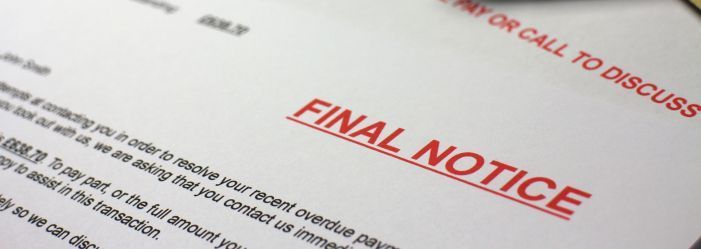Last Updated: July 17, 2024
From Freelance to Garnishee: The Debt Collection Journey for the Self-Employed
Disclaimer: We are not qualified legal or tax professionals and are not giving advice. Always speak with a qualified professional before making any legal or financial decisions.
Unpaid debts, taxes, or child support can lead to wage garnishment through court orders or government actions. For self-employed individuals and independent contractors, the process of garnishing earnings differs from that of traditional employees. While technically not receiving "wages," these workers aren't exempt from garnishment proceedings.
Understanding how garnishment applies to your situation is crucial if you're self-employed or an independent contractor. There may be ways to navigate this process, but it's important to be well-informed about your rights and obligations. This article will explore the specifics of wage garnishment for self-employed individuals and independent contractors.
If you would like to speak to a debt specialist, click here for a free consultation.
What is wage garnishment?
It is a legal process where a portion of your income is withheld to repay outstanding debts. Creditors may initiate court proceedings to garnish wages, while federal and state agencies can do so without a lawsuit.
Once a garnishment order is issued, your employer is instructed to withhold a specific amount from your earnings. This process of garnishing wages continues until the debt is fully repaid, at which point the garnishment is lifted.
There are ways to protect yourself from wage garnishments besides paying your debt on time. We discuss those in this article: How to Stop Wage Garnishment
Types of debt that can result in wage garnishments
The following types of debt can be garnished:
- Back taxes
- Child support
- Defaulted student loans including federal student loans
- Personal loans
- Credit card debt
- Judgments from court cases - you were sued for damages in another case
- Back rent or rental property damage
- Medical bills
- Utility bills
- Phone bills
- And any other debt for personal, family, or household purposes
Legal Requirements for Garnishment
There are some legal requirements and legal protections around wage garnishment. These are defined in the Consumer Credit Protection Act (CCPA). The federal laws overseen by the US Department of Labor include the following protections:
- Employees are protected from discharge (being fired) by their employers because their wages have been garnished for any one debt. Two or more garnishments are not protected.
- The amount of an individual's earnings that may be garnished in any one week for certain types of debt is limited.
- The amount of earnings that may be garnished in any pay period is limited to 25 percent of disposable earnings or the amount by which disposable earnings are greater than 30 times the Federal minimum hourly wage of $7.25 per hour, whichever is less.
- If wages are garnished for child and spousal support, up to 50% of an individual's disposable earnings can be garnished if a current spouse or child not the subject of the support order, and up to 60% if the individual is not doing so. An additional five percent can be added for support payments over 12 weeks in arrears.
Disposable earnings are also defined as the amount of earnings left after legally required deductions are made. These deductions include:
- Federal, state, and local taxes
- Individual's share of Social Security, Medicare, and unemployment insurance taxes
- Contributions to state employee retirement systems required by law
Some deductions that are not required by federal law are included in disposable earnings and are not considered when determining disposable income. These include:
- Union dues
- Health and life insurance premiums
- Charitable contributions
If you have certain bankruptcy court orders or debts due for Federal or state taxes, there are no restrictions on the amount of wages that can be garnished.
Voluntary garnishment is also not limited by federal or state law.
Each state has additional protections. If you are facing income withholding or are voluntarily requesting this from your employer, speaking with a qualified attorney is very important to protect yourself and your money.
How does wage garnishment work for self-employed individuals?
If you are self-employed, you are not covered under Title III of the CCPA. You technically are not receiving a wage from an employer. This includes independent contractors, many business owners, and gig workers. However, there are ways around this.
Garnishment for property other than personal earnings or non-earnings garnishment
In non-earnings garnishment, there are several methods of garnishment. These include:
- A one-time compensation drawn from payment for services rendered such as commissions, receivables from a particular source, or a contract payment.
- Non-wage garnishment is similar to a bank levy (freezing and account) or property seizure. To read more about freezing accounts:
- Up to 100% of your expected compensation can be garnished.
- Till taps by the local sheriff (taking funds out of a cash register) can be used.
How wage garnishment works for traditional employees vs. self-employed individuals
As you can see, It is far more onerous for self-employed people. If you are self employed, you must protect your assets.
Read more: Frozen Bank Account Nightmare? Learn How to Unfreeze it!
Calculation of the amount to be garnished for self-employed individuals
Since potentially 100% of your income or bank account can be seized, it is very important to protect yourself. First, pay your bills on time. Second, set up your bank accounts as recommended above to protect those assets.
Steps to take if facing wage garnishment as a self-employed individual
In order to determine if you are a self-employed individual, determine of you are legally considered to be one. Most states use the following criteria. In general, you:
- Control the hours worked, location, and method
- Are responsible for paying taxes and other expenses
- Do not receive employment benefits, such as insurance, vacation, or a pension.
- Are not restricted from having other clients or pursuing other business opportunities.
- Are not performing broad or continuous services central to the employer's business.
If you are considered a "contractor" but your employer does not match the criteria, speak to a lawyer as you may be protected.
Understanding your rights as a self-employed individual
Because this is a fairly murky area, we strongly enough you to speak with a qualified attorney to protect yourself. However, if you are self-employed, do what you can to avoid non-earnings garnishment.
Negotiating a payment plan with the creditor
When facing potential legal action, try negotiating with your creditor to avoid court. Legal proceedings can be costly, potentially leading to wage garnishment that significantly impacts your income. Proactively contact your creditor to arrange a payment plan before receiving a formal demand. The threat of garnishing wages can often motivate creditors to negotiate. Ensure all agreements are documented in writing and honor your commitments to strengthen your position.
Seeking legal advice from an attorney specializing in debt and wage garnishment
If you are facing either wage garnishments or non-earnings garnishment we strongly urge you to protect yourself by hiring a lawyer who understands this type of law.
FAQs
Conclusion
Wage garnishment is a court order to take money from your earnings to repay a debt. Any creditor can sue for garnishment, and some federal and state entities can garnish wages without a court order for back taxes, spousal support, or child support.
To avoid the severe financial consequences of garnishment, it is crucial to pay your debts on time. If your debts are nearing collections or legal action, try negotiating with your creditor. Proactively managing your finances and seeking a settlement or payment plan can help you avoid any type of garnishment.
Speak to an attorney about your situation and take steps on protecting yourself. If would like to speak to a debt specialist, we offer a free consultation to go over your options.
Disclaimer: Pacific Debt Relief explicitly states that it is not a credit repair organization, and its program does not aim to improve individuals' credit scores. The information provided here is intended solely for educational purposes, aiding consumers in making informed decisions regarding credit and debt matters. The content herein does not constitute legal or financial advice. Pacific Debt Relief strongly advises individuals to seek the counsel of qualified professionals before undertaking any legal or financial actions.
Reduce Your Credit Card Debt By Up to Half

BBB Reviews | 4.9/5.0 Rating










 Do Not Sell My Personal Information
Do Not Sell My Personal Information